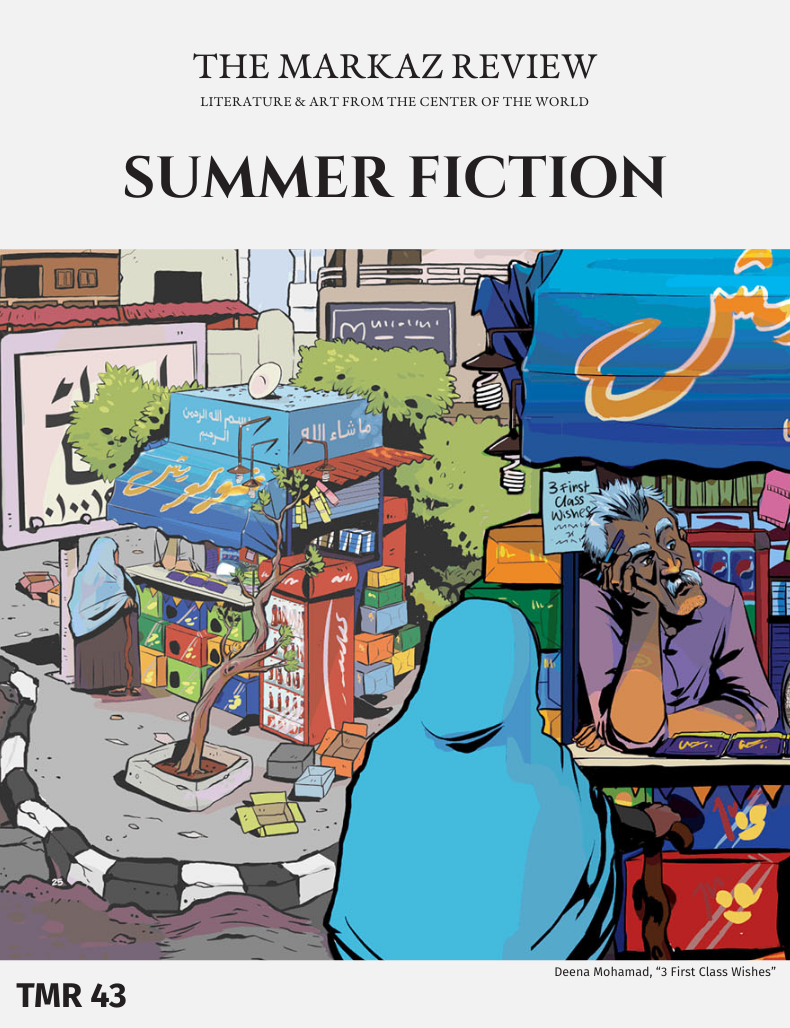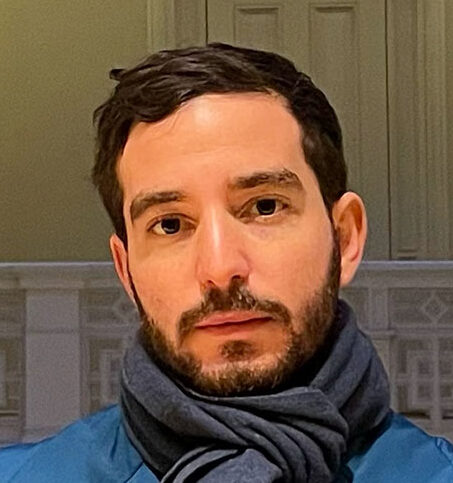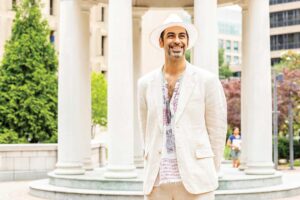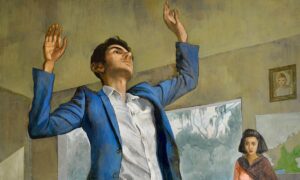In exercises to “release your inner child,” meditation, or psychotherapy, Beirutis search for mental and physical relief.
The evening when dance came into my life, I was on Careema’s balcony. She needed help repotting her hundreds of plants, untangling them from the Babylonian garden they formed in the sky of Beirut. I squatted in front of withered lilies, which now smelled like cat piss, and my knees popped and cracked like tree twigs. Sasha, the awkwardness ethnographer, noticed and said, “I know your metabolism slows in your thirties, but you’re starting to sound like a Victorian grandma.” Careema, who looked like she was farming in the Beqaa valley, with smudges of dirt on her cheeks and fingers, laughed, “Even his spirit is very old-world these days. All Malek needs is a martini glass and a poignant stare, and he’s ready to say, ‘Gather round children, for I have a story to tell.’”
“Way to make me feel even older? Anyway, let’s take a break,” I said. We went inside, and sat on the dining table, in a bohemian cavern of pleasure cards and Hanshi paper with yesterday’s revelations scribbled around miniature cherry blossom trees beside a bunch of burnt palo santo. Sasha crossed his legs in the manner of a Lebanese woman in her fifties and lit a cigarette, which prompted Careema to scold him, “I told you no smoking indoors.”
“You know, when you’re walking outside in Beirut, you’re also smoking indoors, right? Marlboro Light is better than those generator fumes,” exclaimed Sasha.
“Let’s get back to the important issue: what will I do about my knees?” I said, “In my last session with my psychoanalyst, I realized I’d internalized my mother’s melancholy. Is that why they’re cracking?”
“Psychoanalysis just makes you crazier,” Sasha said before eating a pistachio maamoul, splitting it in half with his mouth; an aroma of orange blossom emerged. “Hmm, is this real pistachio? A rarity since the economy derailed,” he commented. “Anyways, Malek, you’ve been seeing this analyst for years, and what good has it gotten you? All you say is mother and lack. Lebanese men are born with a maternal obsession, and you don’t need more of that.”
To my surprise, Careema agreed with Sasha and went on to say, “It’s true, Malek; you’re stuck in the past too much. You’re supposed to heal your inner child and move on, not reenact it. Why don’t you meditate? That always helps me.”
Sasha ate the last bits of the maamoul and snapped — his voice increased as though a fan was accelerating inside his throat. “Don’t listen to her; meditation was invented by Americans to get you back to work. Calmer employees are more productive.”
Careema screamed a laugh and said, “Sasha, it’s an ancient practice. What are you talking about?”
“We’re not in the Indus Valley Civilization. Most people are meditating with a white woman from Maine on YouTube,” he said. “In any case, what both of you need is to have sex. The most profound healing happens in bed.”
“Cheers to that,” I said, raising an invisible martini glass.
Careema rolled her eyes and said, “Listen.” Her voice took on a softer tone, which often meant sincere advice was on its way. “I am starting this dance therapy class with a man called Siwar. It’s in an old house in Ein El Mrayseh. Many of my friends have experienced deep releases with him. He claims he’s the reincarnation of Tahia Carioca, the famed Egyptian belly dancer.”
“Ahaahaha,” snickered Sasha. He had this abundant laugh that could climb ten flights of stairs. “Reincarnation of Tahia Carioca? It sounds like a scam. The only thing to be released in Ein El Mrayseh is your wallet.”
“It does sound like a scam, but why not? I haven’t danced since Bardo closed down,” I said.
Careema winked, and we agreed to meet at the studio at noon.
It was strange to be back in Ein El Mrayseh, my family’s home and source of lament. I was born into my parents’ anguish about their changed city and lived through their nostalgia more than I was allowed to live in the streets of Beirut. So I avoided many of their haunts and memory triggers, from the Wimpy in Hamra to Casablanca in Ein El Mrayseh. I did not want to be a ruin. “We’ve lived in this neighborhood for 300 years,” my grandma would say, “and now it’s full of prostitutes and a McDonald’s — that’s what Beirut has come to, thighs and burgers!” Beirutis have this pride about being in the same area for decades; perhaps they imagine there is a consolation prize for not moving. But now that I’m back in Ein El Mrayseh to dance, in this charmed cul-de-sac with its warped alleyways, its terrazzo-tiled houses, and the bougainvillea plants of purple, yellow, and red that dotted every terrace sat in quietness, which is unfathomable for Beirut at noon, I understood that their sadness was about abandoning this fishermen’s village tucked inside a city and being thrown out into a real Beirut swallowed by towers and crooks.
Careema arrived a few minutes into my daydreaming, and she hollered, “Yalla.” She was wearing these baggy yellow shorts that fell right over her knees, and her eyes were drawn in by the excitement of newness. Behind her was a nondescript house with a sign that said Studio Tahia. It had yellowish walls and pockets of humidity formed from the sea near us. The roof had a satellite dish and a water storage tank tucked behind a dozen or so snake plants, a few feet tall, standing guard over the house. The everydayness of the studio and the curtains draped over the windows, with just a bit of peeking potential left, made me wonder about the past lives of those who lived here, stealing glances from the window overlooking the fishermen’s port. Near the entrance was a shirtless man with a gaze fixed on the road in some sort of trance — his chest was balmier than Beirut in August. I waved at him, inquiring about the class, and he stood up, put a shirt on, and said, “I’ve done cross-fit, pilates, yoga, you name it. But nothing like this.”
Careema rubbed her hands. “Exciting,” she said, and I nodded in appreciation.
Inside, the air smelled of sage and sea salt, causing my nostrils to flare out. Careema inhaled a stretched breath and said, “I’m home.”
“And welcome home indeed,” said a zany attendant, handing us two small white towels with “joy” sewn in red in the middle. “Careema and Malek, right? You’re here for the restorative dance class?” she asked.
“Yes,” I said with a bit of hesitation. “Welcome! We will start shortly if you can just fill out this health form,” she moved around the room with gold anklets clung to her. The form was a mixture of familiar and odd questions. Checkboxes for asthma, heart issues, and medications, but then came the more piercing questions —
Do you have a history of somatic disorders?
In which organs do you hold stress in your body?
Do you hate tight collars?
Have you or anyone in your family experienced severe trauma?
Do your feet touch the ground?
I was unsure what to say, who had not been traumatized while living in Beirut. So, I answered “perhaps” to all of them.
In the dance room, four people were sitting across its wooden floors, each snuggled in an imaginary corner of safety. Across the room was a timeline connecting the words “raqs,” “qalb,” and “jasad” — a triptych composed of dance, heart, and body. The attendant dimmed the lights, closed the curtains and banished Ein El Mrayseh out of sight; there was no peeking for us. When the music played, it began with a soft oud ensemble, the type you would hear during a somber Ramadan night, and it stayed like that for a bit as an unknown, almost clinical voice asked us to relax. One of the students, who had glutes carved out of an ancient stone, stood up and swayed, guided by a softness in the air, as she danced with the voice. I envied the ease with which she performed in front of strangers. A short while later, the oud swirled into accelerated drumming played on the tabla, increasing more and more until it found a home in the base of my spine, so I closed my eyes and swayed inside my mind.
A melody of rustling bangles and carefully punctuated footsteps brought me back to the floor, and when I opened my eyes, I witnessed a tall man dressed in a shimmering red belly-dancing suit. He stood under the Murano glass chandelier, absorbing the columns of light descending from it. Thick kohl drew in mystery under and around his eyes, and from the sides of his shaved head dangled large golden earrings. On his waist was a belt with diamond sequences, and from it a light red fabric trailed the ground, a map he seemed to have surveyed many times before.
“Welcome all,” he said, moving his arms through invisible hoops in the air. The drums sped up again, but they could not compete with the aliveness in his torso, dancing in alternating moods of sensuality and vulnerability. He controlled each hip with terrifying precision, and I wondered how one’s body could be an architecture. His stomach had a mouth of its own, and it moved independently from the rest of his body, opening and closing as his face took on the appearance of someone on the verge of tears. His hands flew across the room like carrier pigeons, and when they returned to him, he smiled. We were a small class, but the intensity with which he shook us remade us into a crowd abuzzing with energy. I watched, mesmerized, and for a brief moment, I felt present.
When the dancing stopped, we looked around each other, unsure whether we should clap for Siwar, who, coming down from an ethereal haze, sat on the floor and dabbed his forehead with a towel. “This is the state I want you to embody after you complete this course,” he said, with a tone exuding compassion. “Now stand up and hold each other’s hands, and together we will form a souk, a marketplace of hearts and minds,” he said, coming near me and holding my left hand. “Close your eyes, and without judgment, tell me what brings you here today.” I closed my eyes and heard people with varying derelict and hopeful voices say, grief — change — boredom. It was my turn, and all I could muster up was neck pain. Siwar whispered in my ear, “Did you ever listen to your neck? It might be telling you something.” His words tingled across my body, and I was not sure if it was euphoria or the fear that I was in the presence of difference. I looked over to Careema, who was already in tears, and I understood that Siwar would become “her person.” She had a new person every year, who moved her along a checkpoint in life. Sometimes it was a chakra healer, other times a sound bather, and this time a dancer.
We retreated to our corners, and Siwar instructed us to stretch our legs. “Look at them,” he said, “and thank them for all the times they’ve carried you. When we’re young we’re close to the ground and connected to it. As we grow older and taller, we lose track of that connection, instead focusing on imaginary stress coming down from the sky.” It was the first time I stared at my legs, and I experienced gratitude for all the long walks they’ve taken me on and all the tiptoeing out of awkward hookups. “Now get up and move your hips and jaw in tandem. Right left, the slower, the better,” Siwar said. “If you find yourself crying or laughing, don’t be scared. Before we can dance, we need to learn to control our body’s micro muscles, which often store emotions within them.” I tried to move my hips in coordination with my jaw, but it was like pushing Roman pillars. Siwar walked across the room and placed his hands around my hips, taming a small fright within them, and said, “Let go of your thoughts and be a cloud. The body knows what to do.” I attempted to be a cloud, but my mind told me clouds are lonely, just flying there in the sky, unable to touch or fully grab someone. Siwar felt my stuckness and sent flowing energy around me, propelling my body and spirit into a rhythm. He smirked, “See, there is a Shakira somewhere there. Let her out.”
By the end of the class, we had spent an hour learning about the anatomy of sensations in our body, from the balls of our feet to our occipital ridge. “Now it’s time to close the class. I want you to dance for pleasure. Jump, yell, twirl, belly dance, do whatever makes you unfurl,” said Siwar. What followed was a series of tantric beats, interrupted with tropical bird sounds, and the people around me soared into all sorts of wild acrobatics. Careema was overjoyed, her chest wider than the sea across us.
“Bravo, Careema! Just be,” Siwar proceeded to look at me. “No more standing and observing,” he said. “Take my hand, and let’s skip over your old self,” causing me to fly into memories of how much I hated gym class in school and how group activities overwhelmed me, so I twirled across the room in some Sufi trance while various images of an angry part of me, a sobbing part, and a paranoid part appeared. When the music stopped, I found myself on the floor, gasping for air, with Siwar standing over me. He said, “You’ve arrived.”
Since that first day, Siwar has become our new ritual — the more classes we did, the more that hit of just one more dance increased within us. On his hardwood floor, our limbs grew taller; he taught us theatrics and versions of the body we did not know existed. We talked about him over wine and instructed others to go see him to heal their distress. Each time we left his class, the world had vibrant shapes, colors, and overall ease. Even Sasha admired this new version of me. “You went from Victorian grandma to Natasha Bedingfield, feeling the rain on her skin,” he said.
Six months into our journey with Siwar, the attendant told us they had a special ceremony prepared for us. “You will be awarded a completion certificate for all your hard work,” she said with a twinkle in her eye. That night, when Siwar opened the door, he looked more tired than usual, and a smile battled fatigue in his mouth. He complimented us on our outfits. I was still in shorts, but Careema, honoring the seriousness of this occasion, sported a flowy business suit, the type a life coach would wear. There was no one else in the studio, and after giving us a certificate printed in gold, he took us to his office, which we had never seen. There were no tables or chairs, just a hammock and a meditation corner.
He looked to his left and said, “This is the real surprise.” On the wall were these large posters with bad resolution, the type you would get after printing from an iPhone. “It’s an estate in Ehden.” Siwar pointed at a vast and empty mountain range with snow-capped hills. “This is my ultimate vision,” he said, “a healed dance community away from the ruckus and politics of Beirut and in the foothills of the mountains.” He put his arms over our shoulders and announced, “I haven’t extended this invitation to everyone, but together with certain members of the community, we’ve been pooling money to buy this estate. We still need $200,000.”
“Of course, you can contribute as much as life has given you, just like in my classes,” he said. Careema nodded without talking, and suddenly trepidation crawled across my body. The studio, usually washed with joy, now appeared gloomy. Siwar stared blankly into my eyes and said, “Just imagine all of us together there, dancing and finding God among the oak and juniper trees.” I stared back at him, but this time his face was different; he wasn’t Tahia the dancer; he was Siwar, a salesman with a pitch drawn on his face, an expression of greed I had seen countless times on the faces of Lebanese men in Beirut, selling you a promise. I trod carefully and said, “It looks beautiful. Vast like you. How about we think about it and get back to you next week?”
“Yes, I have some money I’ve wanted to invest, and I would love to help. I will speak to my accountant,” Careema said. Siwar tightened his hips, wanting to say more, but he smiled and said, “Of course, my love. Now let’s shimmy.”
When we left the studio, we walked through the silence of the sunset until we arrived at the corniche. “I don’t think I will go back there,” I said.
“Why? He didn’t force us to pay or anything. It’s just a community. Half of the Chouf Mountains are filled with yogis and homeopaths, so why is he different?” she said. “People need a break from the brutality of this city.”
“Yeah, but this just has a different air about it. And the amount he’s requesting, come on, who has that money to spare right now?” I said.
“This is your old self speaking. Don’t go back to that,” she said, her tone growing disparate.
“I have a gut feeling about this, and as painful as it is to let go of dance, it’s not wise to go back there,” I said.
“Well, I won’t stop just because you’re scared,” Careema said. “I’m not telling you to stop; just promise me you won’t give him any money,” I replied.
“I won’t,” affirmed Careema. We then stayed silent, sitting at the sea’s edge, watching the last rays of the sun dissolve.
The first few weeks after stopping with Siwar were the hardest. I battled a rigidity that would come and go in my body, and I was filled with anger and regret. I avoided looking at my feet just like I avoided his calls, which did not stop for a month. He eventually gave up, sending me a final message. I hope you will still dance. Careema remained a regular at the studio, but we no longer discussed his classes — it was one of those friendship matters that you tucked away. But like all unspoken things, they eventually cough themselves out. One evening, Sasha and I got an urgent message from Careema asking us to meet her at Salon Beyrouth, and when we arrived, we found her sitting across the bar, forlorn with her glass of wine.
“What’s wrong?” Sasha asked.
“You were right,” she said. I knew what she meant.
“How much did you give him?” I asked.
“Luckily, just a few thousand dollars. I was planning to go up to 10,000,” she said.
“Who are you talking about?” Sasha asked.
“Tahia Carioca,” Careema and I replied. “Last week I arrived at the studio excited to start my celestial belly dancing course only to find panicked students looking at a door left ajar and the studio was empty; nothing left but the chandelier in the living room,” Careema said.
Sasha feigned a sigh of sympathy, but deep down he was joyous that his cynical worldview had been reinforced. He hugged Careema and said, “First he stole belly dancing from women, and now he stole your money. I warned you against joining this cult.”
“Shut up, Sasha,” I said. “Don’t worry, we’ll find him eventually. We just need all his students to file a report to form a critical mass.”
“This is a country of thieves. No one will care,” Careema looked up from her wine glass, and for the first time I witnessed serious disbelief on her face. “We will haunt him in every cabaret around the world until we find him,” Sasha said, causing us both to laugh.
Soon after filing the report, rumors began to fly. Some believed he moved to Venezuela, using the money to open a studio with his cousin in Caracas. The shirtless man from our first day, who we came to know as Youssef, developed an obsession with him, trailing the mountains of Ehden with his militia brother, yelling from his jeep, “If I find you, I will kill you, you scoundrel.”
Others still had faith in Siwar, like Effat, who knew in her heart that he would return. “He can’t just leave like that. He’s just preparing for us to join the estate, right?” she asked me when I ran into her at the supermarket.
We eventually gave up, and like much of life, we forgot. Yet now and then, I would wonder, if I ran into Siwar, what would I say? Though I never did, until one day, years later, I went to a party in Badaro, and at midnight, as the crowd multiplied, I stepped outside to a large balcony, and I heard from the distance a familiar voice because it exuded an irresistible combination of confidence and compassion. “I lead these restorative hiking rituals across Lebanon. You know that as you grow older, you connect more with the stress in the sky, but your feet are what ground you. Do you ever look at your feet and thank them? You will on this hike,” the voice said. I followed it, peeking from behind a corner wall, and it was Siwar. There was no belly-dancing suit and no feminine mystique. He was buff now, with biceps bloated like Beirut’s traffic and a full head of hair. He had a different bohemian look, a silver ring on each finger, and a pyramid tattoo in the middle of his chest. He saw me, and his eyes lit in panic, causing him to retreat from the woman. “It’s getting late; I have to run,” he said.
I dashed across the balcony, running after him and through the rapids of life, but he was gone. Inside the house, I yelled, “Siwar, are you there? I know it’s you,” but everyone stayed silent, giving me the look that this was the drunk man of the night. I went back outside, scanning the streets of Beirut, turning my head in all directions, until I found him entering a taxi. He looked up at me, smiled, and said, “Just shimmy.”












![Ali Cherri’s show at Marseille’s [mac] Is Watching You](https://themarkaz.org/wp-content/uploads/2025/09/Ali-Cherri-22Les-Veilleurs22-at-the-mac-Musee-dart-contemporain-de-Marseille-photo-Gregoire-Edouard-Ville-de-Marseille-300x200.jpg)
























































































Exploring MK’s version of Beirut is always a pleasure, drawing the reader into the intricate tapestry of the city and the characters who dwell within its forceful escapism.